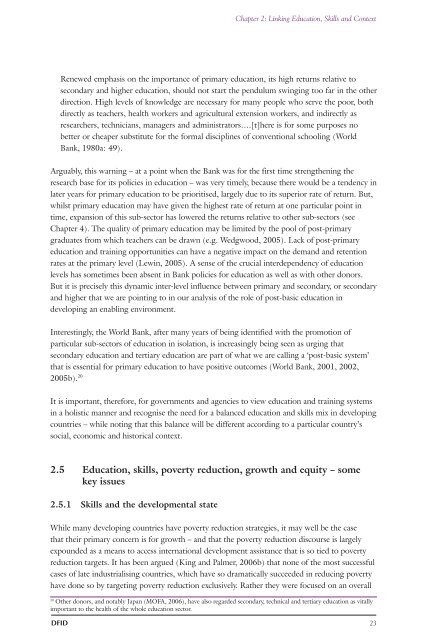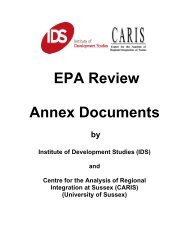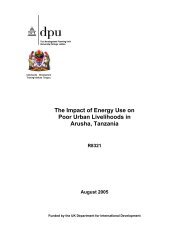Educating out of Poverty? A Synthesis Report on Ghana, India ... - DfID
Educating out of Poverty? A Synthesis Report on Ghana, India ... - DfID
Educating out of Poverty? A Synthesis Report on Ghana, India ... - DfID
Create successful ePaper yourself
Turn your PDF publications into a flip-book with our unique Google optimized e-Paper software.
Renewed emphasis <strong>on</strong> the importance <str<strong>on</strong>g>of</str<strong>on</strong>g> primary educati<strong>on</strong>, its high returns relative to<br />
sec<strong>on</strong>dary and higher educati<strong>on</strong>, should not start the pendulum swinging too far in the other<br />
directi<strong>on</strong>. High levels <str<strong>on</strong>g>of</str<strong>on</strong>g> knowledge are necessary for many people who serve the poor, both<br />
directly as teachers, health workers and agricultural extensi<strong>on</strong> workers, and indirectly as<br />
researchers, technicians, managers and administrators….[t]here is for some purposes no<br />
better or cheaper substitute for the formal disciplines <str<strong>on</strong>g>of</str<strong>on</strong>g> c<strong>on</strong>venti<strong>on</strong>al schooling (World<br />
Bank, 1980a: 49).<br />
Arguably, this warning – at a point when the Bank was for the first time strengthening the<br />
research base for its policies in educati<strong>on</strong> – was very timely, because there would be a tendency in<br />
later years for primary educati<strong>on</strong> to be prioritised, largely due to its superior rate <str<strong>on</strong>g>of</str<strong>on</strong>g> return. But,<br />
whilst primary educati<strong>on</strong> may have given the highest rate <str<strong>on</strong>g>of</str<strong>on</strong>g> return at <strong>on</strong>e particular point in<br />
time, expansi<strong>on</strong> <str<strong>on</strong>g>of</str<strong>on</strong>g> this sub-sector has lowered the returns relative to other sub-sectors (see<br />
Chapter 4). The quality <str<strong>on</strong>g>of</str<strong>on</strong>g> primary educati<strong>on</strong> may be limited by the pool <str<strong>on</strong>g>of</str<strong>on</strong>g> post-primary<br />
graduates from which teachers can be drawn (e.g. Wedgwood, 2005). Lack <str<strong>on</strong>g>of</str<strong>on</strong>g> post-primary<br />
educati<strong>on</strong> and training opportunities can have a negative impact <strong>on</strong> the demand and retenti<strong>on</strong><br />
rates at the primary level (Lewin, 2005). A sense <str<strong>on</strong>g>of</str<strong>on</strong>g> the crucial interdependency <str<strong>on</strong>g>of</str<strong>on</strong>g> educati<strong>on</strong><br />
levels has sometimes been absent in Bank policies for educati<strong>on</strong> as well as with other d<strong>on</strong>ors.<br />
But it is precisely this dynamic inter-level influence between primary and sec<strong>on</strong>dary, or sec<strong>on</strong>dary<br />
and higher that we are pointing to in our analysis <str<strong>on</strong>g>of</str<strong>on</strong>g> the role <str<strong>on</strong>g>of</str<strong>on</strong>g> post-basic educati<strong>on</strong> in<br />
developing an enabling envir<strong>on</strong>ment.<br />
Interestingly, the World Bank, after many years <str<strong>on</strong>g>of</str<strong>on</strong>g> being identified with the promoti<strong>on</strong> <str<strong>on</strong>g>of</str<strong>on</strong>g><br />
particular sub-sectors <str<strong>on</strong>g>of</str<strong>on</strong>g> educati<strong>on</strong> in isolati<strong>on</strong>, is increasingly being seen as urging that<br />
sec<strong>on</strong>dary educati<strong>on</strong> and tertiary educati<strong>on</strong> are part <str<strong>on</strong>g>of</str<strong>on</strong>g> what we are calling a ‘post-basic system’<br />
that is essential for primary educati<strong>on</strong> to have positive <str<strong>on</strong>g>out</str<strong>on</strong>g>comes (World Bank, 2001, 2002,<br />
2005b). 20<br />
It is important, therefore, for governments and agencies to view educati<strong>on</strong> and training systems<br />
in a holistic manner and recognise the need for a balanced educati<strong>on</strong> and skills mix in developing<br />
countries – while noting that this balance will be different according to a particular country’s<br />
social, ec<strong>on</strong>omic and historical c<strong>on</strong>text.<br />
2.5 Educati<strong>on</strong>, skills, poverty reducti<strong>on</strong>, growth and equity – some<br />
key issues<br />
2.5.1 Skills and the developmental state<br />
Chapter 2: Linking Educati<strong>on</strong>, Skills and C<strong>on</strong>text<br />
While many developing countries have poverty reducti<strong>on</strong> strategies, it may well be the case<br />
that their primary c<strong>on</strong>cern is for growth – and that the poverty reducti<strong>on</strong> discourse is largely<br />
expounded as a means to access internati<strong>on</strong>al development assistance that is so tied to poverty<br />
reducti<strong>on</strong> targets. It has been argued (King and Palmer, 2006b) that n<strong>on</strong>e <str<strong>on</strong>g>of</str<strong>on</strong>g> the most successful<br />
cases <str<strong>on</strong>g>of</str<strong>on</strong>g> late industrialising countries, which have so dramatically succeeded in reducing poverty<br />
have d<strong>on</strong>e so by targeting poverty reducti<strong>on</strong> exclusively. Rather they were focused <strong>on</strong> an overall<br />
20 Other d<strong>on</strong>ors, and notably Japan (MOFA, 2006), have also regarded sec<strong>on</strong>dary, technical and tertiary educati<strong>on</strong> as vitally<br />
important to the health <str<strong>on</strong>g>of</str<strong>on</strong>g> the whole educati<strong>on</strong> sector.<br />
DFID 23

















